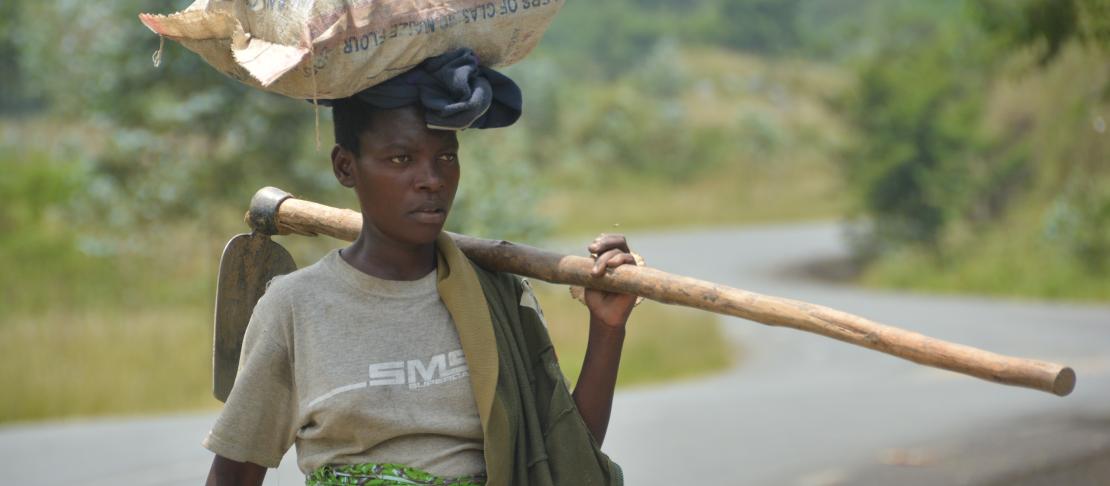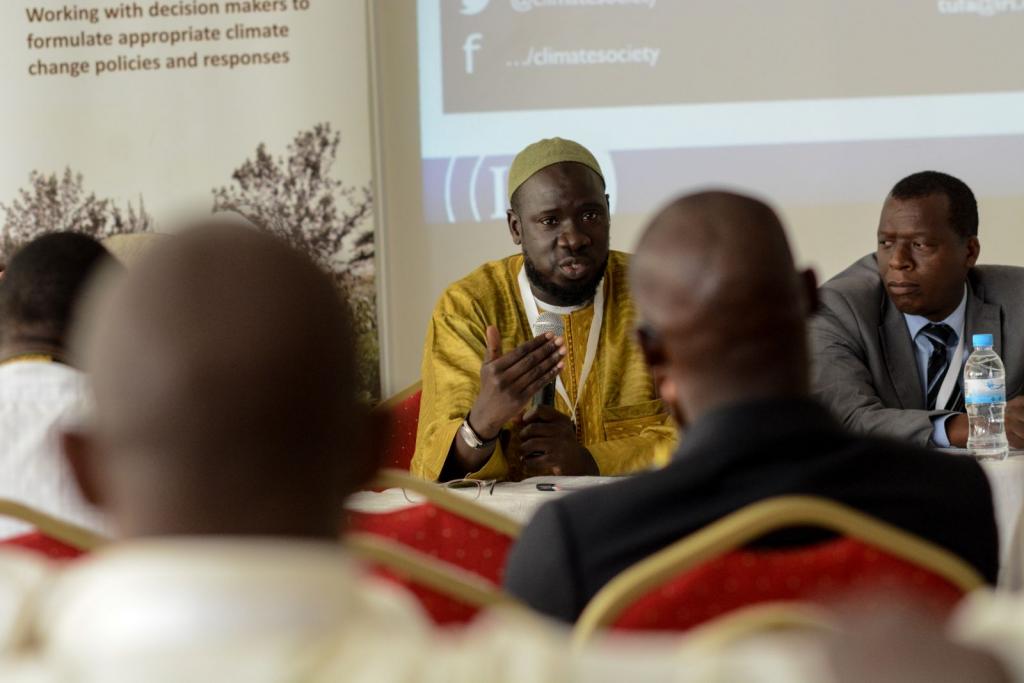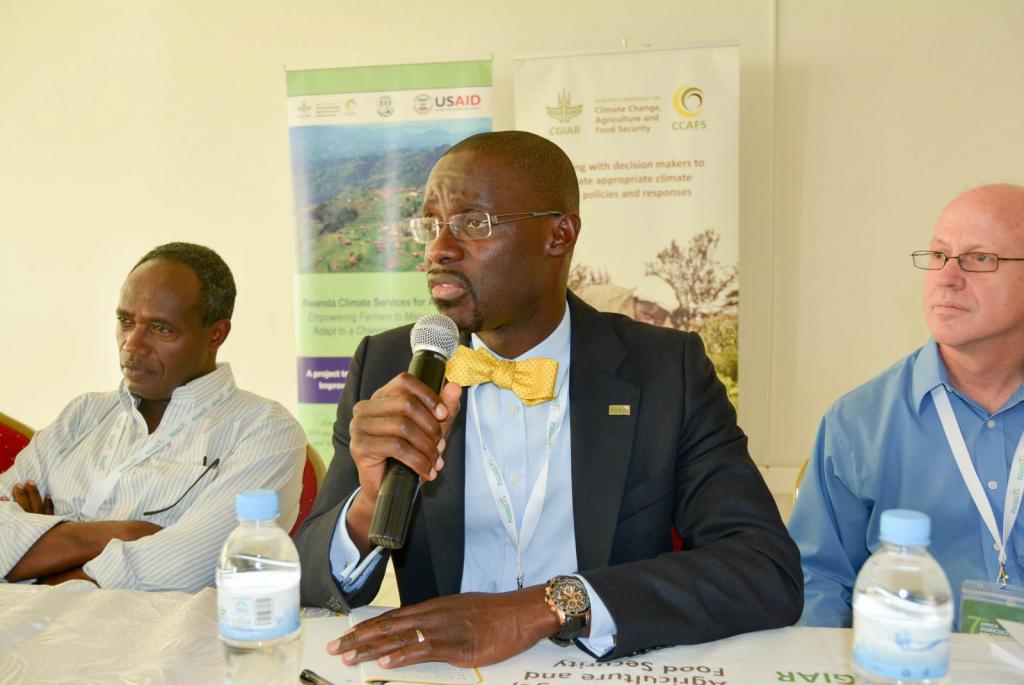Managing uncertainty in a changing climate: what's the role of climate services?

On the sidelines of the recently concluded Africa Agriculture Science Week, various stakeholders discuss exciting opportunities to make climate services available to farmers.
Apply science, impact livelihoods. This was the theme of the just concluded 7th Africa Agriculture Science Week (AASW7). The event took place from 13 to 16 June in Kigali, Rwanda.
The CGIAR Research Program on climate Change, Agriculture and Food Security (CCAFS), the Center for International Tropical Agriculture (CIAT), the Rwanda Agriculture Board (RAB) and the Rwanda Meteorological Agency (Meteo-Rwanda) held a side event on strengthening climate services for agricultural transformation in Africa on the sidelines of AASW7 in Kigali. The event created an opportunity for policymakers, scientists and technical experts from the CGIAR and other research institutions, as well as the National Meteorological and Hydrological Services (NMHSs) and other stakeholders to learn from and build on examples of good practice in farmer-focused climate information and advisory services in Rwanda and Senegal, and to share elements of good practice in agricultural planning and food security management in the face of a variable and changing climate.
Setting the scene, current status and new initiatives
In his welcoming remarks, John Ntaganda Semafara, Director General of Meteo-Rwanda, emphasized the loss of climate data as a result of the 1994 genocide tragedy in Rwanda; and described the work his agency is doing with partners to rebuild the database. This is in recognition of the key role that climate data plays informing decision making in critical sectors such as health, agriculture and aviation. For agriculture, which accounts for a third of Rwanda’s GDP, climate services can inform effective decision making, and more so for rural households (especially women) who rely on this as their main source of livelihood.
“There is hope. On 23 March, the Rwanda Climate Services for Agriculture project was launched,” pointed out Désiré Kagabo during his presentation on transforming the agriculture sector with improved climate information services. The project is the result of collaboration between CCAFS, Meteo Rwanda, RAB, CIAT and the International Research Institute for Climate and Society (IRI) at Columbia University through funding by the United States Agency for International Development (USAID). According to Kagabo, the aim of the project is “to benefit nearly one million farmers by 2019, and transform Rwanda’s rural farming communities and national economy through climate services and improved climate risk management.” The project seeks to improve the supply, communication and use of climate-related information in a balanced manner using products co-developed by both providers and users. According to Malick Haidara from USAID Rwanda's Economic Growth Office, who participated in the discussions, climate services are crucial for all investments related to agriculture including USAID's Feed the Future initiative ongoing in several countries.
Read more: Building climate services capacity in Rwanda
Project launch: Reaching a million farmers in Rwanda with useful climate services
Opportunities for south-south collaboration

Ousmane Ndiaye (centre) gives a keynote address during the side event. Photo: G. Smith (CIAT)
Senegal has made great strides in applying climate services in the agriculture sector. Ousmane Ndiaye, from Senegal National Meteorological Agency (ANACIM, French acronym), shared some lessons through his presentation on challenges and opportunities of delivering climate information and services from the national perspective, Senegal experience.
“Because of the uncertainty associated with forecasting, trust is the building block for an effective climate services project to be successful,” emphasized Ndiaye. “Understanding the social dimensions that influence farm level decision making and the role of indigenous knowledge are two very key ingredients for this to work,” he reiterated.
Also, partnerships, which are both long-term and multi-stakeholder, are essential to facilitate the compilation, packaging and sharing of useable information which is context-specific and in a language and format that farmers can use to make decisions.
Data is the foundation for building climate services
In his presentation, titled 'Technical innovations enabling African NMS to provide information at the local scale of farmer decision-making', Tufa Dinku, from the International Research Institute for Climate and Society (IRI), Columbia University, highlighted the key role that climate data plays in the development of effective climate services for agriculture.
Some of the challenges which affect the availability of climate date include: the inadequacy of the number of weather stations over many parts in Africa; location of most stations along main roads hence limited availability of climate information and services to the rural community; gaps in observations (missing data); questionable data quality and limited access and use of the available data.
The Enhancing National Climate Services (ENACTS) initiative seeks to address these challenges by focusing on the creation of reliable climate information that is suitable for national and local decision making. This approach has been used to generate over 30 years of rainfall and temperature data for every 4km grid.
Read more about ENACTS: Involving users in the creation of climate information products
Enhancing climate services for agriculture in Africa

Tufa Dinku (left), Malick Haidara (center) and James Hansen (right) during a panel discussion session on climate services. Photo: J. Recha (CCAFS).
A panel session created an opportunity to deliberate on examples of good practice in farmer-focused climate information and advisory services, and to share elements of good practice in agricultural planning and food management in the face of a changing climate. The panel also highlighted possible areas of investment and areas that require policy intervention.
The following key messages emanated from the event:
- Data are the foundation of any effective climate services. The development of useful information products for end users along the agricultural value chain calls for filling in of data gaps and facilitating data accessibility.
- Partnerships with key stakeholders involved in the generation of data and development and delivery of information are critical to ensure accessibility and timely delivery of information.
- Countries need to put in place policies that enable researchers and a range of users to access climate data, which are a critical component of developing useful climate services and products.
- Climate services should be gender sensitive, ensuring that all end users including women and youth are reached by relevant climate information. Feedback loops are necessary to ensure the development of relevant and targeted products which take into consideration user needs. Social norms that affect access to information at community level should be examined.
- Information is most useful for farmers if it is communicated through a range of channels, including trained agricultural extension staff, radio and mobile phones. Social media is emerging as a new way to reach out to youth engaging in agriculture.
- Investment in climate services is an essential component of Africa’s agricultural transformation, as stakeholders in the agricultural sector need forecasts and advisories that will enable them to make decisions in the context of an increasingly variable climate.
View photos of the side event on Flickr below:
Blog written by Catherine Mungai, CCAFS Partnerships and Policy Specialist with contributions from Vivian Atakos (Communications Specialist, CCAFS EA) and James Hansen (CCAFS Flagship Leader on Managing Climate Risk).



